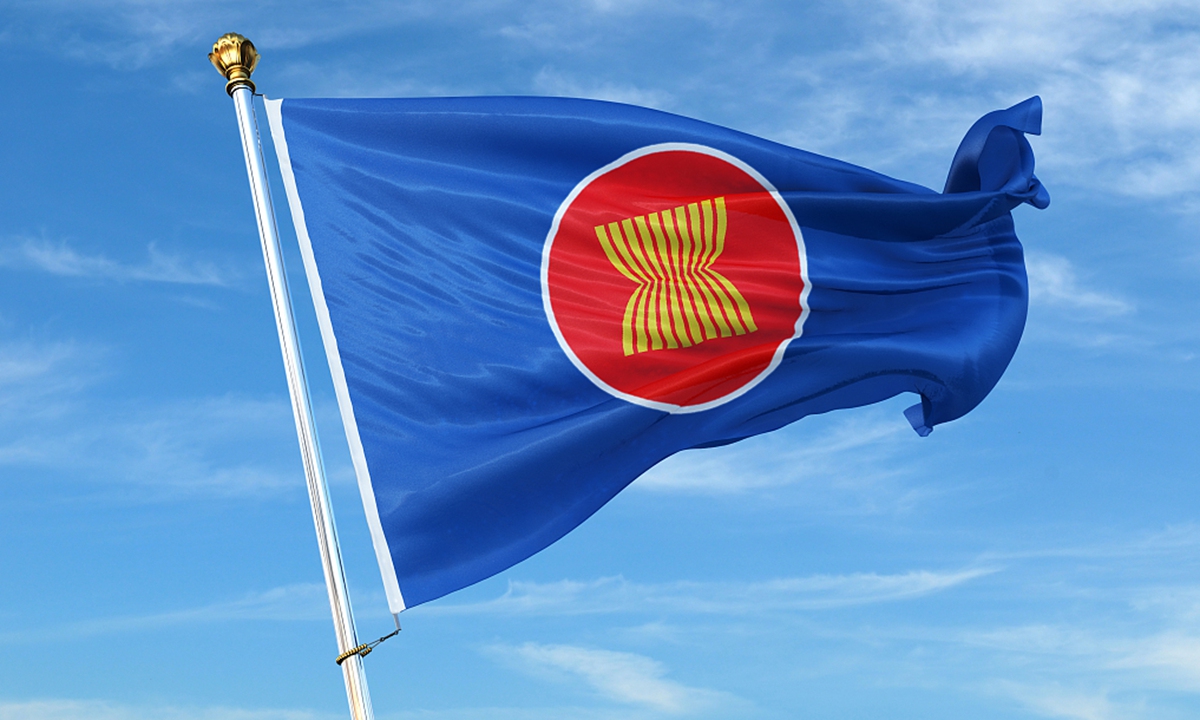 ASEAN flag. Photo: VCG
ASEAN flag. Photo: VCG
US Secretary of State Antony Blinken is participating virtually with various ministerial-level events related to the Association of Southeast Asian Nations (ASEAN) for five consecutive days commencing from Monday.
Two of the total five meetings are scheduled to discuss issues about the Mekong River, with five Lower Mekong countries participating—this is being done with an obvious intention to target China.
Chinese State Councilor and Foreign Minister Wang Yi will also attend the series of foreign ministers' meeting on East Asia Cooperation from August 3 to 6.
Washington is attempting to encircle China. The US is sparing no efforts to ramp up its ties with Southeast Asian countries in a bid to reduce China's influence in the region.
In regard to this series of meetings, US Department of State on Monday issued a briefing which said, "The United States commitment to the Indo-Pacific is grounded in our commitment to ASEAN centrality." But according to media reports, Myanmar and China's so-called coercion in the South China Sea will be discussed.
In words, Washington has repeatedly underlined to maintain ASEAN centrality in regional cooperation. But in reality, Washington has been acting "from a position of strength" toward ASEAN members in multilateral situations. Washington has been imposing some of its own ideas on ASEAN members on issues of both Myanmar and the South China Sea. Washington has not lived up to its commitment to respect and uphold ASEAN centrality.
In terms of the South China Sea issue, the US has repeatedly provoked other claimants in the region into conflict with China. This is being done in an attempt to change their stance on the disputed waters.
This fully displays the hypocrisy of US diplomacy: it says one thing, but does another.
It is noted that senior US officials have kicked off frequent visits to Southeast Asian countries. US Vice President Kamala Harris, hard on the heels of Secretary of State Antony Blinken and Defense Secretary Lloyd Austin, is set to visit Southeast Asia too. Washington seems to be launching a wave of intense lobbying toward ASEAN members.
It demonstrates that ASEAN's status and influence has been rising. But Washington's repeated emphasis on attaching heavier importance to ASEAN is aimed squarely at China. Seeing China as its top rival, the US believes China's expanding influence in this region threatens its regional and global hegemony.
For ASEAN members, they are willing to see the US truly take them seriously. But their attitude toward the US mainly depends on whether or not they can gain practical benefits. If Washington only pays a lip service, ASEAN members will not buy it. If Washington wants to exert larger influence on ASEAN countries, it needs to provide what ASEAN needs. Otherwise, Washington will lose their trust in the region.
In late May, Blinken tried to hold a virtual meeting with his ASEAN counterparts. Ironically, the meeting was cancelled due to technical glitches. It is reported that Blinken kept the top diplomats from Southeast Asia waiting 45 minutes before blank screens.
ASEAN countries are now more focused on economic recovery and pandemic prevention measure. The US has promised to provide some vaccines to ASEAN countries. But what Washington has provided is so far is nothing substantial for ASEAN's real needs. This is in sharp contrast to the vaccines China has provided to ASEAN countries.
With regard to economics, especially in terms of industrial and supply chains, Washington pursues unilateralism and seeks to "decouple" from China. By contrast, many industries in Southeast Asia are closely connected with China. The "decoupling" between the US and China has actually impaired the interests of ASEAN members and it is not conducive to their economic recovery.
The US' roping in ASEAN members may interfere in the cooperation between China and the bloc to some extent. However, the general direction will not change.
China-ASEAN cooperation is based on the fundamental interests of both sides and the needs of the two peoples. It does not target at any third party. Investment and trade between China and ASEAN have been booming in 2020 in spite of the negative impact of the COVID-19 pandemic. This shows the potential and driving force of China-ASEAN cooperation. It is not a result under pressures from Washington. It instead stems from natural growth between them over the past 30 years.
(Xu Liping, director of the Center for Southeast Asian Studies at the Chinese Academy of Social Sciences in Beijing. The views don't necessarily reflect those of this platform)






